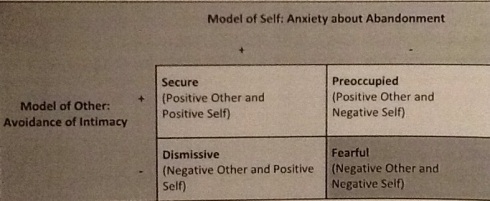Dr Grant Bickerton, a psychologist who has recently done a PhD on burnout and people in cross-cultural missions, found that the number one determiner of lasting the distance on the m field is your experience of God, where you:
i) have a positive view (“model”) of self and a positive view of God (“Other”), i.e., “I am a child of a God, loved by Him, and, whatever happens, He is allowing it/doing it with good intentions” (see Table below),
ii) relate in an intimately collaborative way with God, i.e., not “You are the one who acts and I’m going to do nothing” (avoidance) or “I am in this situation now and I have to figure out a way to get out” (self-directed control) but “I am in this situation, You are in control – Lord I ask for peace as I follow you, as I step forward in faith” (collaboration), and
iii) have a continually confirming and strong perceived sense of ‘call’ to the work.
He calls these three things ‘spiritual resources’. (Apt, I think!) His research suggests that when these three particular things hold true they are linked to resiliency and the ability to effectively influence and impact one’s environment. Isn’t this what the cross-cultural worker desires? If so, should we not be pursuing them with enthusiasm and as first priority?
I was challenged to ask myself: How can I adjust the way I relate to God so that I am continually growing in intimacy with Him? How can I continue to grow in paying attention to God’s communication with me and in responding to this personally communicating God, and so live out the consequences with peace and assurance? Bickerton very helpfully pointed out that “you can adjust the way you relate to God/experience Him by living out what you want to see changed”. I need to grow in my spiritual disciplines and to pursue what I want to see changed in my journey towards holiness.
Does either of the two dimensions of anxiety about abandonment or avoidance of intimacy resonate with you? Where would you position yourself on the table above? Remember: you can adjust it by living out what you want to see changed!
